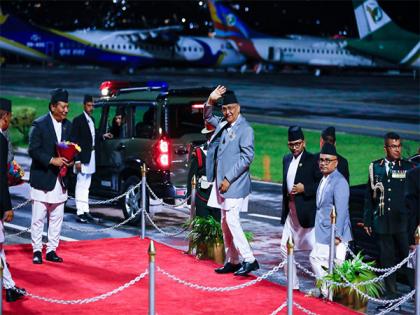Nepal's Foreign Secy rejects China's claim on GSI
By ANI | Updated: September 4, 2025 08:55 IST2025-09-04T08:50:23+5:302025-09-04T08:55:17+5:30
Kathmandu [Nepal], September 4 : Nepal on Thursday rejected China's claim that it agreed to support the Global Security ...

Nepal's Foreign Secy rejects China's claim on GSI
Kathmandu [Nepal], September 4 : Nepal on Thursday rejected China's claim that it agreed to support the Global Security Initiative (GSI) during Prime Minister KP Sharma Oli's recent visit to China.
Nepal's Foreign Secretary Amrit Bahadur Rai clarified that Nepal has only supported the Global Development Initiative (GDI) and not the GSI or Global Civilisation Initiative (GCI).
"Over China's initiative, Nepal has only supported the Global Development Initiative. Nepal has joined the Global Development Initiative's group of friends, which was formed within the United Nations. Regarding the other initiatives, Nepal hasn't supported it and no agreement has been reached over it, it is clarified hereby," Rai said.
Nepal maintains a non-aligned foreign policy and has consistently rejected the GSI, citing that it contradicts the country's stance on avoiding strategic and security alliances.
The Chinese Ministry of Foreign Affairs stated on 30 August, following the meeting between Nepali Prime Minister KP Sharma Oli and Chinese President Xi Jinping, that Nepal expressed support for China's Global Security Initiative (GSI).
The statement from the Chinese foreign ministry said, "Nepal supports the Global Development Initiative, Global Security Initiative and Global Civilisation Initiative proposed by China."
"The Government of Nepal's (foreign) policy only would exist, it would only prevail," Foreign Secretary Rai added, rejecting the claims of the Chinese Foreign Ministry.
The Embassy of Nepal in Beijing, which also issued a statement about the meeting between Prime Minister Oli and President Xi, made no mention of any support for the GSI. Similarly, China's Foreign Ministry made no comment about the Lipulekh issue, which was clearly stated in the Nepali embassy's release.
The GSI, a security framework proposed by Chinese President Xi Jinping in April 2022, aims to promote a new model of international security that, according to Beijing, is based on mutual respect, cooperation, and non-confrontation.
Among these initiatives, some GDI programs have already been implemented in Nepal.
But Nepal has consistently rejected the GSI, saying it contradicts the country's non-aligned foreign policy. Nepal maintains that the GSI is a strategic, security-oriented initiative and that it cannot join such strategic blocs amid rising global multi-polarity.
China has a long history of making unilateral claims in its statements, which usually aren't true. Earlier, the Chinese ambassadors in Kathmandu had publicly stated that many projects, including the Pokhara airport, were part of the BRI, despite Nepal never officially confirming it.
Former Chinese ambassador Hou Yanqi and the current ambassador Chen Song have both faced criticism for such claims. Because Chinese diplomats often claim agreements that were never actually made, Nepal often finds itself in a dilemma over whether to trust everything China says.
Ever since Chinese President Xi introduced the GSI in 2022, Beijing has consistently pressured Nepal to join the initiative. This isn't the first time suspicion has arisen over China trying to push the GSI onto Nepal. On 5 October 2022, then-President Bidya Devi Bhandari sent a video message to a GSI-related conference, prompting criticism at home.
Despite the Ministry of Foreign Affairs advising against it, Bhandari participated, allegedly under the influence of the Chinese embassy in Kathmandu, which had lobbied political leaders, including PM Sher Bahadur Deuba.
There are multiple examples of China pushing the GSI during bilateral visits and meetings. On 29 December 2022, Liu Jinsong, Director-General of the Asia Department of China's Foreign Ministry, urged Nepal's then-ambassador Bishnu Pukar Shrestha to support the GSI. China even released a statement about the meeting, but Nepal's embassy didn't respond publicly. Shrestha admitted he was approached but refused, citing Nepal's non-aligned foreign policy.
Six months later, on 12 June 2023, during a visit to China, Nepal's then-National Assembly Chair Ganesh Timilsina was again approached with the proposal by Zhao Leji, chairman of the standing committee of China's National People's Congress.
Several other senior Chinese officials, including Wang Yi and Liu Jianchao, have raised the GSI in discussions with their Nepali counterparts.
Disclaimer: This post has been auto-published from an agency feed without any modifications to the text and has not been reviewed by an editor
Open in app